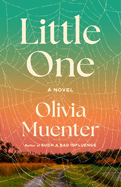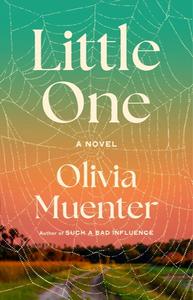
 Olivia Muenter's Little One chills and entertains with the story of a young woman whose fresh start is interrupted.
Olivia Muenter's Little One chills and entertains with the story of a young woman whose fresh start is interrupted.
Since leaving the intentional community run by her father in rural Florida, Catharine West has built herself a life from scratch in New York City. She has a successful copywriting career, visits the public library at least once a week, runs daily, and enjoys a snarky friendship over drinks with the disarming Stella, who says of Catharine's library habit, "You do realize this isn't actually a Nora Ephron film." She doesn't date much, which Stella attributes to a bad breakup or fear of change. Catharine holds people at arm's length, privately enforcing upon herself some of the same obsessive standards she learned back at the farm, including extreme fasting and self-deprivation. She has shared her past with no one, which is why it's so alarming when a journalist e-mails out of the blue with questions about "a little-known, now-defunct cult in central Florida." Catharine's carefully crafted, tightly controlled existence is threatened. But in balance with that risk hangs the chance that she might recover the one part of her past that she never meant to lose: her sister.
Little One, Muenter's second novel (following Such a Bad Influence), follows Catharine in alternating chapters marked "Then" and "Now." Catharine's remembered Florida begins as idyllic, sunny, verdant, a childhood spent "chasing the coolest parts of the day, picking tomatoes at dawn, bringing each to my nose and marveling at the smell, all at once familiar and astounding." But what began as a close-knit community with back-to-the-land ethics gradually became something sinister, sticky, and alligator-ridden in the oppressive heat.
In the present-day timeline, Catharine becomes increasingly involved with the journalist, Reese, whom she finds both attractive and off-putting. As she strings him along, giving him just enough to get back the information she needs from his unnamed source, it may be that she's met her match. Meanwhile, readers recognize past Catharine (in her father's steely grip) in the present one (wielding an ironclad control over her own life). Fasting becomes exercise compulsion and an obsession with willpower; the concept of hunger, in its various meanings, is central to the plot. Muenter's expertly moody, creepy-crawly narrative is precisely paced. Secrets as off-balance as Catharine herself are released at a tantalizing rate that might just keep the reader up all night, as the novel accelerates toward a satisfyingly surprising conclusion. --Julia Kastner, blogger at pagesofjulia
Shelf Talker: A young woman's troubled past resurfaces in this novel of psychological suspense and secrets.

